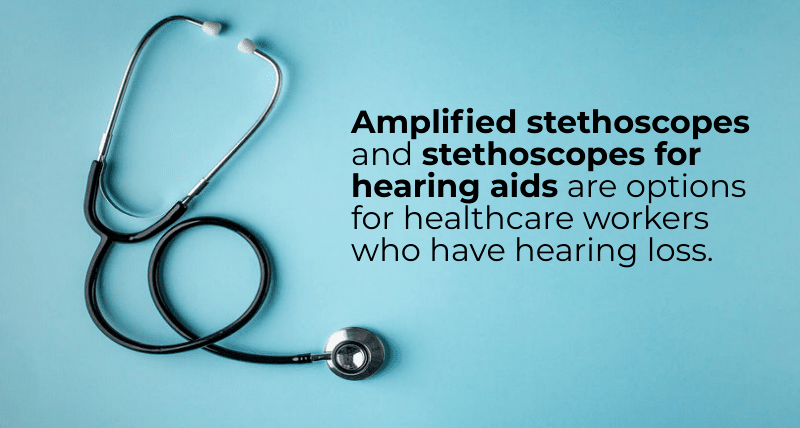|
www.HealthyHearing.com |
Stethoscopes for medical professionals with hearing lossWhile no perfect solution exists, there are many workarounds
Contributed by Joy Victory, managing editor, Healthy Hearing Key points:
Like anyone else, a medical professional might have hearing loss in the higher frequencies or they may struggle to hear low frequencies, known as reverse-slope hearing loss. Their hearing loss might be mild enough that they don’t yet wear a hearing device or profound enough to warrant cochlear implants. 
Today’s sophisticated digital hearing aids are programmed to address hearing loss at specific frequencies, providing varying levels of amplification based on the hearing loss. However when the use of a stethoscope enters the picture, issues can occur. To address these challenges, medical professionals with hearing loss have several options to help them address this common problem. Amplified stethoscopesThese specialized stethoscopes amplify sound as much as 30 times the normal sound quality and, depending on the model, can be used with or without hearing aids. Who are they designed for?People who have mild hearing loss and good low-frequency hearing. There are many choices available. As the Association of Medical Professionals With Hearing Loss (AMPHL) states, "many brands offer amplified stethoscopes with conventional binaural tubing for those who may wish to remove their hearing aids or who have good residual low frequency hearing." Stethoscopes for hearing aid wearersMedical professionals who prefer not to remove their hearing devices can reconfigure standard and amplified stethoscopes to work with their hearing aids based on the type of hearing aid they wear. The AMPHL has a handy comparison table of four brands, ThinkLabs ONE, EKO Core 500, 3M Littman Core, and Stemoscope Pro. All can be adapted for hearing aid users when connected to over-the-ear headphones, are Bluetooth compatible and have a maximum amplification range of 40-100x. Only the EKO Core offers an EKG function. Other things to know
An audiologist can help you find a stethoscope solutionSince sound amplification and noise reduction are the two most important aspects of hearing well with a stethoscope, it’s important for you to choose a solution based on your needs and preferences.
Get the help you needStemoscope has a handy flowchart to help you make a decision about what works best for you (scroll down the page to find it). The best news for patients and medical professionals is that there are solutions for connecting stethoscopes to hearing devices. Thanks to today’s hearing aids, cochlear implant and stethoscope technology, it’s simply a matter of finding the best combination of tools to address both the hearing loss and amplification needs. As a medical professional, see a hearing professional if you experience even minor hearing loss. And if you’re a patient, you can have confidence that a medical professional with hearing loss delivers the quality of service you demand. To find a hearing care provider near you, go to our directory of consumer-reviewed hearing clinics. Joy Victory, managing editor, Healthy Hearing
Related Help Pages:
Hearing aids Accessories Assistive listening devices and systems Amplified phones
|
Featured clinics near me
Earzlink Hearing Care - Reynoldsburg
7668 Slate Ridge Blvd
Reynoldsburg, OH 43068

Find a clinic
Need a hearing test but not sure which clinic to choose?
Call 1-877-872-7165 for help setting up a hearing test appointment.


 Joy Victory has extensive experience editing consumer health information. Her training in particular has focused on how to best communicate evidence-based medical guidelines and clinical trial results to the public. She strives to make health content accurate, accessible and engaging to the public.
Joy Victory has extensive experience editing consumer health information. Her training in particular has focused on how to best communicate evidence-based medical guidelines and clinical trial results to the public. She strives to make health content accurate, accessible and engaging to the public.